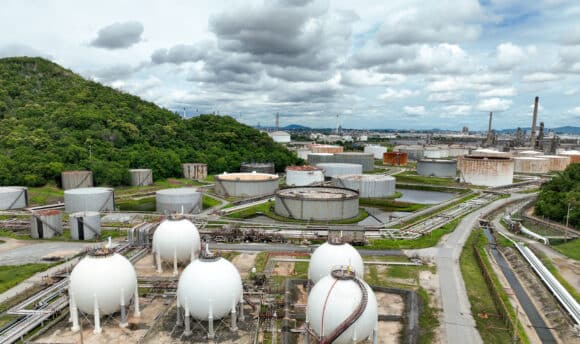13 global insurers have restricted support for oil and gas expansion, increasing pressure on U.S. insurers to follow suit
18 October 2022 – This year steps by U.S. insurers look out of touch with the escalating pace of climate impacts. Global insurance company restrictions on oil and gas are finally starting to catch up with those on coal, according to new data from the Insure Our Future campaign. Ahead of COP27, the campaign coalition argues that insurers must now fully exit new coal, oil and gas, and demonstrate that the industry is ready to deliver ambitious near-term action.
Insure Our Future’s annual scorecard ranks the top 30 global fossil fuel insurers on the quality of their fossil fuel restrictions. This year marks the sixth annual publication of the scorecard. Yet again, the report reveals how U.S. insurers are outmatched by their global peers at the top of our scoring: Allianz, AXA and Axis Capital rank best for their coal exit policies, while Aviva, Hannover Re and Munich Re come out on top for their oil and gas exclusions.
At the bottom of the rankings are a group of insurers which have yet to adopt any restrictions on cover for coal, oil or gas projects, including U.S. insurers Berkshire Hathaway and Starr and Bermudan carrier Everest Re. Liberty Mutual and Chubb adopted some piecemeal restrictions on coal in 2019 that they have not updated since, while actively insuring the expansion of the oil and gas industry.
“Insurance is the Achilles heel of the fossil fuel industry and has the power to accelerate the transition to clean energy. All insurance companies must immediately align their businesses with the 1.5°C goal of the Paris Agreement and cease insuring new coal, oil and gas projects.”
Coal, meanwhile, has become increasingly uninsurable outside of China. The number of coal exit policies has grown from 35 to 41 this past year, with major U.S. insurers AIG and Travelers finally joining the fray. The market share of insurers with coal exclusions has reached 62% in the reinsurance and 39% in the primary insurance markets. Remaining coal insurers lack the expertise or capacity to underwrite large new coal power plants outside China, the Insure Our Future report concludes.
The U.S. lags behind Europe’s progress
As the global insurance industry’s movement away from oil and gas picks up momentum this year, the largest North American fossil fuel insurers – even those who have made significant strides – lag behind. No U.S. insurers have a policy on oil and gas expansion, despite having the largest market share of oil and gas underwriting. Among North American insurers, only Fidelis, a Bermudan insurer, has instituted a bold policy restricting the underwriting of oil and gas projects and companies.
AIG’s first ever climate commitment covers their underwriting of coal, tar sands and the drilling in the Arctic, while Travelers commitment only covers coal and tar sands. As one of the top oil and gas insurers in the U.S., Travelers needs to step up and take bold action to address it’s underwriting of new fossil fuel projects. A recent report from the Willis Tower Watson Power Market Review makes it clear that AIG’s recent policy to move away from coal will have a substantive climate impact: “A major global American insurer’s Net Zero commitment announced earlier this year came sooner than expected and has further worsened the already challenging environment for Coal insurance.”
Seventeen global insurance companies have responded to Gwich’in demands to avoid oil and gas projects in the Arctic National Wildlife Refuge, yet no American insurance company has a similar policy. (Note: AIG’s policy lacks a definition of the Arctic and doesn’t explicitly name the Arctic National Wildlife Refuge.) Travelers and The Hartford refused a request to meet with the Gwich’in Steering Committee in September. Chubb, Liberty Mutual and others have never even replied.
“Insurance companies can’t be expected to absorb the growing costs of climate disasters alone, but it is unacceptable that they are abandoning climate-affected communities while continuing to fuel the climate emergency by underwriting the expansion of fossil fuel production."
As Hurricane Ian ravaged the southern coastline of the U.S. this fall, more and more insurers have pulled out of the insurance market in Florida, unable to keep up with the growing cost of insuring homes so often affected by climate disasters. Moreover many extreme weather events can no longer in truth be called ‘natural’ disasters. As attribution science improves, insurance companies could determine which fossil fuel companies are contributing to their growing losses, and by how much. Legal action would make polluters pay, help keep the insurance of climate risks affordable and pressure fossil fuel companies to stop expanding and reduce their production in line with what is needed to keep global warming to within 1.5°C.
“Fossil fuel projects that don't get insured, don't get built. Insurers should take the fifty-plus billion dollars of insured losses from Hurricane Ian as a clarion call for emergency climate action to prevent a future of ever more destructive disasters. Instead of simply reducing exposure on balance sheets and leaving families and taxpayers to foot the bill, they need to cut fossil fuel insurance in line with the latest climate science, and take polluters to court to pay for losses and damages.”
The limits of voluntary commitments
In June, the UN’s Race to Zero campaign mandated that members of net zero alliances “must phase down and out all unabated fossil fuels”. The lack of sufficient voluntary action by the insurance sector highlights the need for greater regulation. In June, as part of its sanctions on Russia, the EU prohibited the provision of insurance for the transportation of Russian crude oil, demonstrating that regulators can act quickly and effectively in crisis situations.
“The climate emergency is the defining crisis of the 21st century and regulators should act as decisively as they have in response to the Ukraine war. They should force insurers to align their businesses with 1.5°C pathways if the companies and their alliances are not prepared to do this on their own.”



